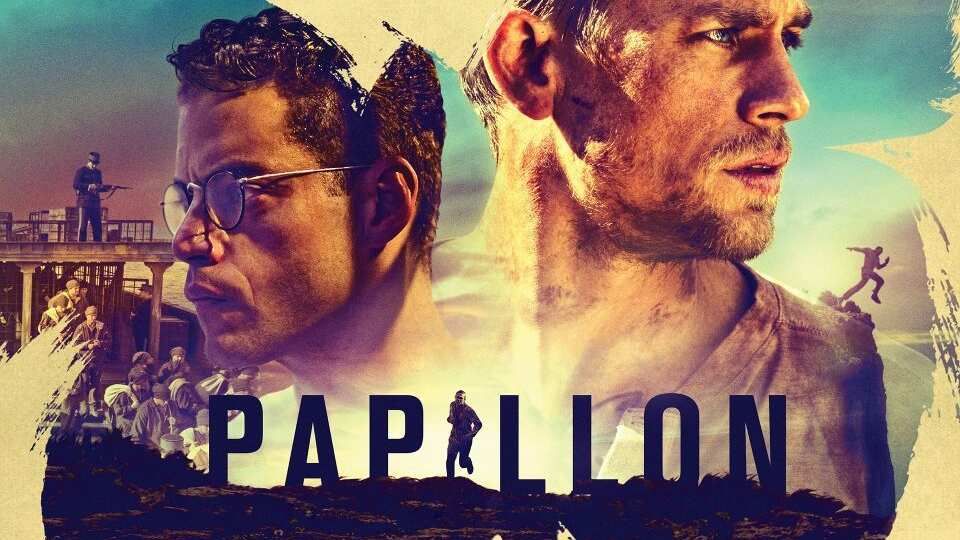Papillon (2017)

“Papillon,” directed by Michael Noer and released in 2017, is a gripping remake of the 1973 film of the same name, which was based on the memoir of Henri Charrière, a notorious French convict. The film stars Charlie Hunnam as Henri Charrière, nicknamed “Papillon,” and Rami Malek as Louis Dega, a forger who becomes Charrière’s close friend. This adaptation presents a harrowing yet inspiring tale of endurance, friendship, and the quest for freedom against seemingly insurmountable odds.
Set in the early 1930s, “Papillon” follows the true story of Henri Charrière, a petty criminal sentenced to life imprisonment on the infamous Devil’s Island penal colony off the coast of French Guiana. Convicted of a crime he did not commit, Charrière’s journey through the brutal penal system and his relentless pursuit of escape form the heart of the film. Alongside him is Louis Dega, a fellow prisoner whose skills as a forger and artist provide crucial assistance in Charrière’s escape attempts.

The film’s narrative is anchored by the intense performances of its lead actors. Charlie Hunnam delivers a powerful portrayal of Henri Charrière, capturing the character’s indomitable spirit and unwavering determination. Hunnam’s performance conveys the emotional and physical toll of Charrière’s imprisonment and his resolute desire for freedom. Rami Malek’s portrayal of Louis Dega complements Hunnam’s performance, bringing depth to the character of Dega, whose intelligence and loyalty play a crucial role in the story. The chemistry between Hunnam and Malek adds a profound layer of emotional resonance to the film, highlighting the importance of their friendship in the face of adversity.
One of the film’s most notable aspects is its depiction of the harsh realities of the French penal system. “Papillon” does not shy away from portraying the brutal conditions of the prison colonies, including the inhumane treatment of prisoners, the unforgiving environment, and the constant threat of violence. The film’s gritty and realistic portrayal of the penal system serves to underscore the immense challenges faced by Charrière and his fellow inmates, adding to the film’s tension and drama.

The cinematography and production design in “Papillon” contribute significantly to its immersive experience. The film effectively captures the oppressive and desolate environment of the penal colonies, using stark visuals and a muted color palette to evoke a sense of bleakness and confinement. The contrast between the harsh prison environment and the natural beauty of the surrounding landscapes further emphasizes the prisoners’ isolation and longing for freedom.
“Papillon” also explores themes of friendship, perseverance, and redemption. The bond between Charrière and Dega is central to the narrative, illustrating how human connection can provide hope and strength in the face of seemingly insurmountable challenges. Dega’s support and companionship are crucial to Charrière’s survival and escape attempts, highlighting the film’s message about the importance of solidarity and loyalty. Additionally, Charrière’s relentless pursuit of freedom reflects a broader theme of redemption and the human spirit’s capacity for resilience.

The film’s pacing and structure are designed to maintain suspense and engage the audience throughout Charrière’s numerous escape attempts and setbacks. The narrative unfolds with a series of dramatic and intense sequences that showcase Charrière’s ingenuity and determination. Each escape attempt presents new obstacles and risks, creating a sense of urgency and anticipation as the story progresses.
However, while “Papillon” is a compelling and well-crafted film, it does face some challenges. The film’s adherence to historical accuracy means that certain elements of the story may feel repetitive or familiar to viewers who are aware of Charrière’s saga. Additionally, the film’s focus on the physical and emotional hardships of imprisonment might overshadow other aspects of the characters’ development. Nonetheless, the film’s dedication to portraying the harrowing realities of Charrière’s experiences and its strong performances contribute to its overall impact.
In conclusion, “Papillon” (2017) is a powerful and gripping adaptation of Henri Charrière’s memoir, capturing the essence of his remarkable story of resilience and redemption. With its intense performances, realistic portrayal of the penal system, and exploration of themes such as friendship and perseverance, the film stands as a testament to the enduring human spirit. Michael Noer’s direction, combined with the strong performances of Charlie Hunnam and Rami Malek, creates a compelling narrative that resonates with audiences and underscores the extraordinary lengths to which one man will go in his quest for freedom.











